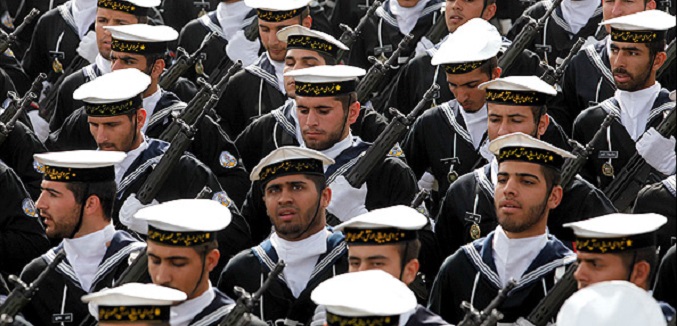Iranian officials over the weekend and into Monday issued a series of statements emphasizing hostility toward the United States, days after a series of articles emerged suggesting that the Obama administration was in many ways laying the groundwork for a regional realignment that would grant the Iranians greater influence across the Middle East.
The American Enterprise Institute’s (AEI) Critical Threats Project conveyed statements from IRGC Navy Commander Brig. Gen Ali Fadavi bragging about the decline of American power and declaring that in the future conflict Iran “will provide security in the Persian Gulf” while the U.S. will be “in a position of passivity” (English, Persian). He insisted that Iran’s energy-based influence has grown despite how “the evil of the Great Satan [the US] remains.” Fadavi’s remarks came at the same time as the Iranian Defense Ministry published another set of inflammatory statements emphasizing the point:
“The U.S. is still the great Satan and the number one enemy of the (Islamic) revolution and the Islamic Republic and the Iranian nation,” the IRGC said in an organizational statement released Saturday to Iran’s semi-official Fars News Agency, which has close ties to the group.
The flurry of attacks came a few days after the Wall Street Journal published a report surveying moves by the White House seemingly aimed at establishing “an effective state of detente” between Washington and Tehran. The outlet highlighted among other things how the administration has “markedly softened its confrontational stance toward Iran’s most important nonstate allies, the Palestinian militant group Hamas and the Lebanese militant and political organization, Hezbollah.” That report was followed by another describing a furious backlash to those moves:
U.S. lawmakers are voicing concern and criticism over warming ties between the Obama administration and Iran, calling it a strategic miscalculation and an affront to Washington’s decades-long alliance with Israel.
Pointing to potential consequences, members of Congress are demanding greater oversight of negotiations now nearing the final stages between Iran and global powers seeking to curtail Tehran’s nuclear program in exchange for an easing of Western sanctions.
On Monday Washington Institute Managing Director Michael Singh assessed that any warming of relations “have been decidedly one-sided,” with the U.S. permitting Iran to promote its interests across Lebanon, Syria, and Iraq at the expense of Washington’s declared goals in those areas. Singh described U.S. shifts across each region and concluded that “what has changed is not Iran’s strategy but the American response… we are choosing to overlook, rather than counter, long-standing Iranian policies.”
[Photo: TIP / Flickr]




